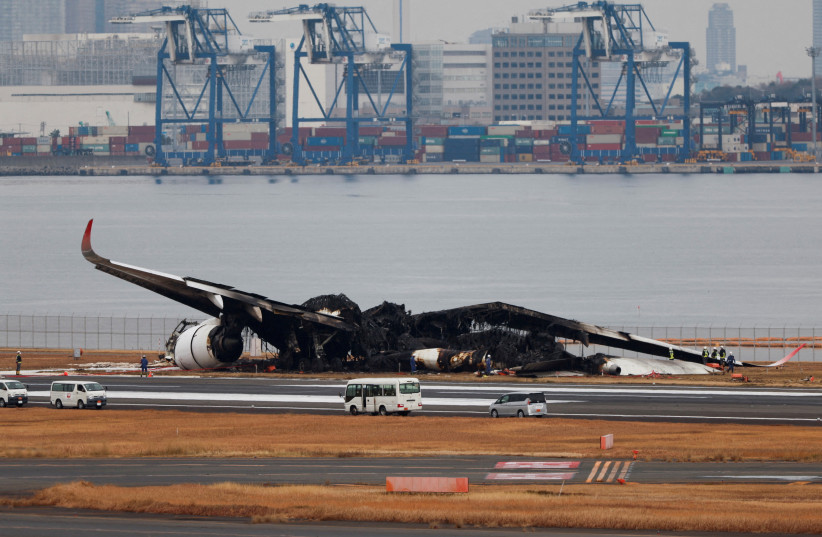A Coast Guard plane was making its third emergency trip to an earthquake zone within 24 hours when it collided with a passenger jet at a very busy Haneda airport, a Coast Guard official told Reuters.
The official declined to be named due to an ongoing investigation into the runway crash between the De Havilland Dash-8 turboprop and a Japan Airlines 9201.T Airbus A350 passenger jet. Five of the six Coast Guard crew died but all 379 people on the JAL plane escaped.
Details of the Coast Guard plane's movements before the collision have not previously been reported.
The surviving pilot from the Coast Guard crew is under scrutiny after authorities released control tower transcripts appearing to show he was ordered to enter a holding area near the runway before the crash occurred.
He said he had permission to enter the runway where the Japan Airlines (JAL) plane was landing, the Coast Guard said on Wednesday, acknowledging there was no indication of that in the transcripts.

It is unclear whether the volume of airport traffic or the emergency response to the earthquake that struck late afternoon on Jan. 1, destroying thousands of homes and killing at least 84 people, were factors in the accident.
Aviation experts say airplane accidents usually involve multiple variables and the failure of several safety guardrails.
In the 24 hours before the collision, the Coast Guard aircraft had already made two round trips from Haneda to the quake zone, a 3.5 hour survey of the area shortly after the magnitude 7.6 quake struck on Jan 1, and a flight carrying rescue workers that returned early on Jan. 2, the official said.
Reuters verified the timings with flight tracking data on adsbexchange.com.
The airport was at full capacity
Tokyo Haneda is the world's third busiest airport, according to OAG, a UK-based travel industry data provider. Flight schedules data from Cirium analyzed by Reuters showed an average of 1,290 flights departed and arrived at Haneda daily in December.
On the day of the accident, a public holiday in Japan, the airport was at full capacity, said Shigenori Hiraoka, director general of the Civil Aviation Bureau.
It was no ordinary day for the Coast Guard either.
The doomed plane had early that morning returned with a different crew from a mission taking relief workers to an area devastated by the earthquake, the Coast Guard official also told Reuters.
Thousands of rescue workers were scrambled to respond to the disaster.
Captain Genki Miyamoto, 39, and his crew were preparing to take the plane - one of four stationed at the Coast Guard base at Haneda - back to the earthquake zone loaded with food and water.
The aircraft arrived back at Haneda from its second mission at 2.30 a.m. local time and left the hanger of the base again at 4.45 p.m., the official said.
The collision occurred at 5.47 p.m., authorities said.
In normal times, the Coast Guard tends to fly mid-morning when runways are less busy, the official said, adding the airport was "very busy" on the day of the accident.
Miyamoto, the pilot, also had a busy schedule.
The day before, he had been on a 7-hour mission to Japan’s southernmost island Okinotori, where he had been surveying a Chinese vessel off its waters. He returned around 5 p.m., just after the earthquake struck.
At that point, his mission the next day was not scheduled, the official said.
Miyamoto suffered severe burns as a result of the crash and could not be reached for comment.
The official said he had been a captain for nearly 5 years and had clocked up 3,641 hours of flight time.
The destroyed aircraft - JA722A - was the only Japan Coast Guard airplane that was not destroyed when a 2011 tsunami hit Sendai airport in northeast Japan, according an official Coast Guard newsletter. It suffered some water damage but was restored and returned to Haneda the following year.
